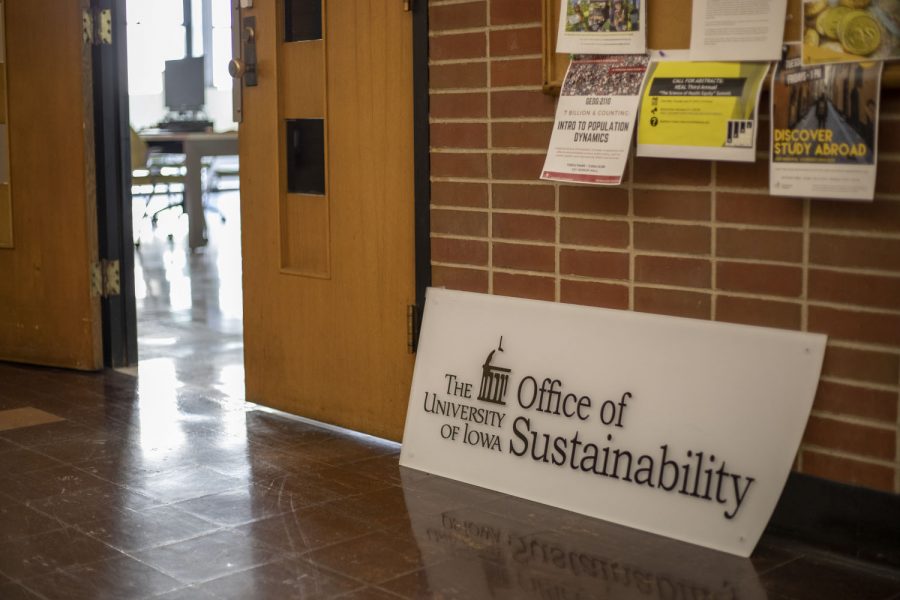University of Iowa releases rough rendition of 2030 sustainability goals
In the midst of the global pandemic and after surpassing the goals set in 2010, the office of sustainability still looks towards the future of sustainability practices at the University of Iowa.
The sign for the Office of Sustainability sits outside its new location on Tuesday, Jan. 29, 2019. The office recently moved to communications building.
September 20, 2020
Despite the effects of the COVID-19 pandemic on instruction, the University of Iowa Office of Sustainability and the Environment is looking forward to the future of sustainability on campus, and recently released a rough draft of their 2030 goals for sustainability.
The university released seven sustainability goals in 2010 to accomplish in the next decade. This year, the sustainability department created six more sustainability goals to implement over the next 10 years.
University of Iowa Office of Sustainability and the Environment Director Stratis Giannakouros said when the office first created its 2010 goals, its primary focus was on areas within the facilities management team’s control, such as transportation and greenhouse-gas emissions.
UI professor in Biology and Chair of the Sustainability Charter Committee Erin Irish said the UI campus has successfully been able to reduce greenhouse- gas emissions by encouraging the use of public transportation since 2010.
The campus transitioned the CAMBUS transit system into using 100 percent clean diesel, a type of diesel that contains less sulfur and harmful emissions, Irish said. According to the metrics from the 2020 sustainability goals, about 20 million vehicle miles were reduced through the U-PASS transportation system.
The UI sustainability office no longer works through Facilities Management, however, and is instead housed under the College of Liberal Arts and Sciences, which enables it to focus its goals on education, Giannakouros said.
He said the office’s most visible measurable goal is to reduce greenhouse-gas emissions by 50 percent, which is more than the recommendations provided by the Intergovernmental Panel on Climate Change.
Marketing Executive for the UI Environmental Coalition Emily Manders, who is also an intern with the Office of Sustainability and the Environment, said she and the coalition think these goals are too broad.
RELATED: Tippie becomes first UI college to adopt United Nations sustainability goals
Manders said that through the years, UI President Bruce Harreld has not been very involved with the sustainability office’s goals. Without a cultural reset, Manders said, the chances of sustainability on campus becoming prudent to all departments is not likely to happen.
Maples said these sustainability goals can help launch a plan going forward to improve sustainability around the world.
“In a world of climate change, racial injustice, poverty and inequality, our university will continue to move towards a new paradigm,” she said. “The sustainability goals use our expertise in thought leadership and education to drive positive change in organizations and communities. We will continue to prepare students to help solve grand challenges of our time.”
Sara Maples, facilitator of the Integration Principles of Responsible Management Education in the UI Tippie College of Business and a member of the 2030 Sustainability Goals Committee, said she has worked toward institutionalizing and integrating sustainability with the Tippie College of Business.
“Businesses are an entity within the broader society and have an important role to play in solving societal challenges,” Maples said. “Businesses are both responsive to desires of the customer and to broader resource challenges.”
Giannakouros said the university will also focus more on encouraging research opportunities in sustainability on campus. The UI would like to grow more prairie on campus to not only expand research but to also localize research efforts, he said.
Sustainability Program Manager with the Office of Sustainability and the Environment Beth MacKenzie said sustainability education is crucial for the future of students, especially the topic of climate change.
“Sustainability is one of the most important topics that is going to impact students’ lives beyond college,” MacKenzie said. “Climate change is a topic that everyone is going to deal with at one point in their future, regardless of what field they’re studying or what career they might take. At some point, sustainability and climate change is going to impact us all.”







